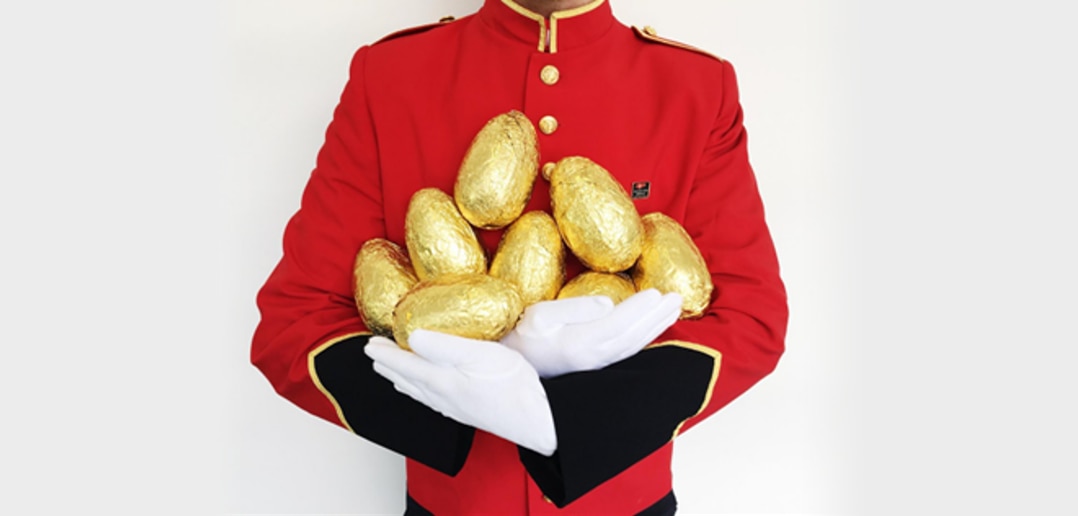Name a more iconic duo than chocolate and sea salt? This Easter Cunard, is on a mission to reveal the science behind this celebrated combination, and why Easter, the holiday famed for its connection to chocolate, tastes better at sea.
Working with Prof. Charles Spence, the leading gastrophysicist from the University of Oxford, Cunard has identified why taking a cruise over Easter can create an unforgettable experience, for both our guests and their tastebuds.
According to Charles, food and drink taste better when having a good time, which is highly likely when travelling on one of Cunard’s Queens. This is known as the ‘Provencal rose paradox’ which Prof Spence claims everyone, especially Northern Europeans, has experienced a version of in their lifetime.[1]
Prof. Spence, leading gastrophysicist from the University of Oxford says:
“It relates to the fact that food and drink seem to taste so much better when we are on holiday, whether this is with our family in the Mediterranean, or travelling solo with the sun on our backs. So nice in fact, that we are even tempted to buy a few bottles of that same holiday wine, to bring back home and share on a cold winter’s evening. Only it never tastes the same; it is disappointing somehow.[2] The reason is that when we are on holiday, we are likely to be relaxed and in a better mood, and food simply tastes better when we are in a better mood. Given that people don’t often cruise for work, they are likely to be happy and relaxed on their cruise hence making food and drink taste better.”
But what about the salty sea air to accompany your chocolate eggs? Salt is a well-known flavour enhancer, helping, for example, to mask bitterness in tonic water or grapefruit, whilst at the same time enhancing the taste of many other foods.[3] Since salt suppresses bitterness and accentuates sweetness, it is the ideal accompaniment to chocolate, likely to work better with a more bitter dark chocolate, than milk or white chocolate.
The flavour-enhancing properties of salt might not be the only cause for chocolate tasting better at sea, as according to Prof Spence, even seeing, smelling, and hearing the sea may also conceptually prime notions of saltiness too, thus enhancing the sensation even further.
Prof. Spence goes on to say:
“Looking out on the sea while simultaneously smelling and hearing the ocean, is all likely to prime saltiness, leading to a more cognitive form of taste enhancement. In an experiment I conducted with a leading chef a few years ago, we were able to show that hearing the sounds of the sea made seafood taste better, so why not chocolate as well?[4]”
In this case, the combination of the salty sea air perfectly complements and enhances the flavours of quality chocolate, offering a distinct contrast between the salty, sweet, and bitter notes of the chocolate. Whilst at the same time, research shows that being close to and viewing the blues of water[5] has a beneficial effect on our social, cognitive, and emotional well-being.[6] The mood and well-being enhancing effect of being by water combined with the iconic taste duo of sea salt and chocolate, then likely suggests that it will in fact taste better whilst on a Cunard cruise.
Lee Powell, Vice President, Brand and Product at Cunard says:
Special occasions deserve special ingredients, and when it comes to Easter, the onboard teams on each of our three Queens go above and beyond to create a suitably indulgent celebration. Our skilled chefs will be creating incredibly elegant chocolate figurines and desserts, our bars will be serving chocolate cocktails and guests will enjoy chocolate treats across the weekend, including a total of almost 6,500 chocolate bunnies!
[1] Spence, C., & Piqueras-Fiszman, B. (2014). The perfect meal: The multisensory science of food and dining. Oxford, UK: Wiley-Blackwell.
[2] Spence, C. (2017). Gastrophysics: The new science of eating. London, UK: Viking Penguin.
[3] Breslin, P. A. S., & Beauchamp, G. K. (1997). Salt enhances flavor by suppressing bitterness. Nature, 387, 563.
[4] Spence, C., Shankar, M. U., & Blumenthal, H. (2011). ‘Sound bites’: Auditory contributions to the perception and consumption of food and drink. In F. Bacci & D. Melcher (Eds.), Art and the senses (pp. 207-238). Oxford, UK: Oxford University Press
[5] Cf. González, J., Barros-Loscertales, A., Pulvermüller, F., Meseguer, V., Sanjuán, A., Belloch, V., et al. (2006). Reading cinnamon activates olfactory brain regions. NeuroImage, 32, 906-912.
[6] Leonor, F., Lake, J., & Guerra, M. (2018). Effect of nostalgia triggered by sound on flavor perception. In R. Bonacho, A. P. de Sousa, C. Viegas, J. P. Martins, M. J. Pires, & S. V. Estévão (Eds.), Experiencing food, designing dialogue (pp. 37-40). London, UK: CRC Press.

